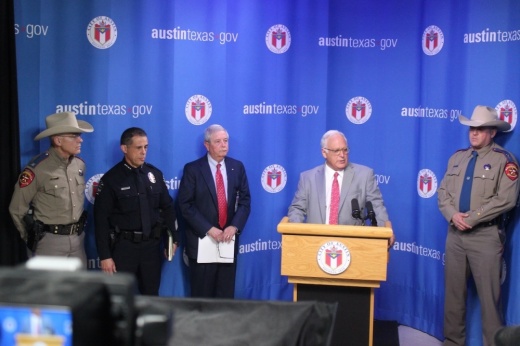The big picture
The partnership, announced at no cost to the city and operating under the direction of police Chief Joseph Chacon, was expected to continue indefinitely while the city and APD worked on filling up the department's ranks. However, the DPS pulled the plug on its support work in Austin on May 13 amid a surge of state resources to the Mexico border announced by Gov. Greg Abbott last week alongside the expiration of the Title 42 immigration public health order.
City leaders announced DPS troopers would begin targeted patrols in Austin to assist the short-staffed APD by focusing on crime and traffic enforcement in late March.
Since then, police officials credited the program for an observed drop in violent crime this spring. At the same time, some community groups and City Council members raised concerns about traffic stop and arrest data showing Black and particularly Hispanic drivers were being disproportionately affected by the patrols.
The details
The outlook for further DPS support in Austin isn't clear following the first month and a half of what Mayor Kirk Watson called "bridge" support for the city's police department. Watson said DPS troopers' border deployment is expected to last at least two weeks, and Chacon will remain in contact with state law enforcement about the program's future.
In a statement, Watson said he viewed the initiative as a success early on given some crime had trended downward and adjustments were made by public safety leaders prompted by the racial profiling concerns.
"The partnership has proven what we knew: Austin is seriously understaffed in its police department. The partnership has led to less crime and a reduction in response times when people call for help. We have also been able to recalibrate it in an effort to address troubling issues and prevent people from feeling targeted, profiled and overpoliced," Watson said.
The DPS did not respond to a request for comment on the end of the partnership as of press time.
Looking ahead, Watson and other leaders have said an upcoming public safety priority is now rebooting labor negotiations with the Austin Police Association and finalizing a new contract with the police union. The last round of contract talks between the city and the APA ended in February amid council debate over police oversight, the then-upcoming May election, and officer recruitment and incentives.
The election featured a pair of similar police oversight proposals—one backed by the APA—and officials agreed voters should weigh in on those items before Austin was locked into a new long-term deal with the police association. Some aspects of Austin's police accountability and transparency system would have to be agreed to in the contract.
By passing Proposition A with around 80% support, voters approved several new police oversight policies that may either be enacted outright or worked into the next contract. Austinites rejected the competing Proposition B favored by the police union, which ended up with around 20% support.
"Now that the May 6 election is over, my hope is we get back to the bargaining table with the Austin Police Association and reach a contract agreement," Watson said.
On election night, APA President Thomas Villarreal said the organization was considering how the city would implement Proposition A and its "illegal provisions" regarding oversight while also stating his hopes of getting a new labor agreement in place.
"The APA continues to prioritize negotiating a long-term contract; however, we will not be forced back to the table under a structure in which a new city ordinance attempts to unlawfully interfere with the statutory rights associated with the meet and confer process," Villarreal said.
A state Senate bill that could cancel out some of Proposition A's contents was pending consideration in the Texas House as of May 15.





